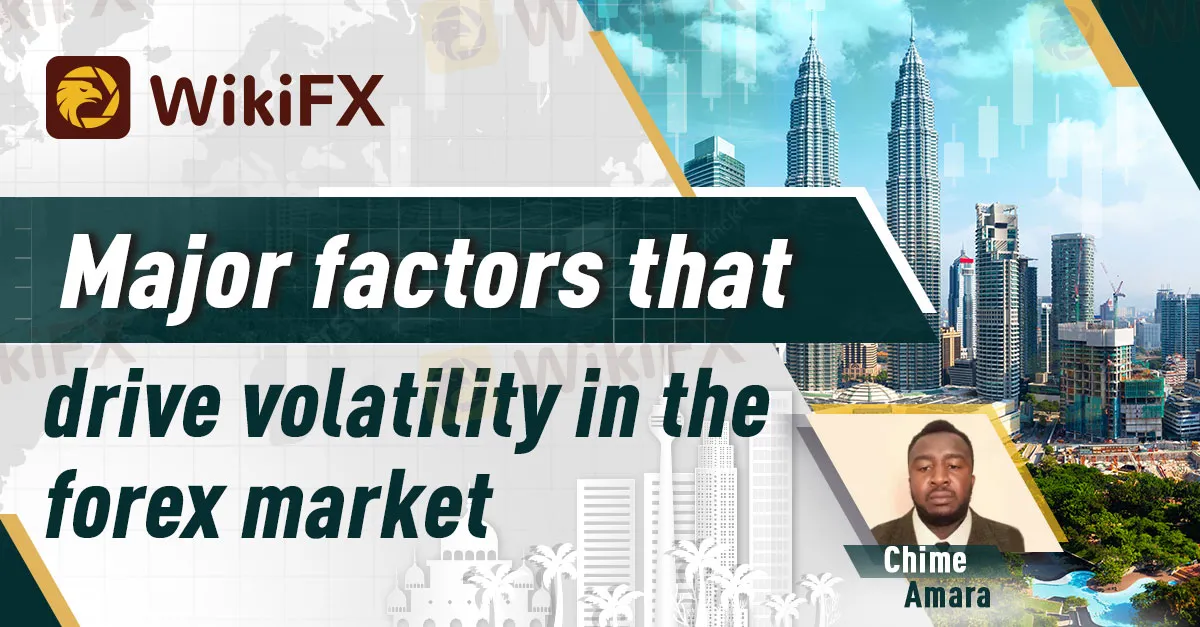简体中文
繁體中文
English
Pусский
日本語
ภาษาไทย
Tiếng Việt
Bahasa Indonesia
Español
हिन्दी
Filippiiniläinen
Français
Deutsch
Português
Türkçe
한국어
العربية
Major factors that drive volatility in the forex market
Abstract:The foreign exchange market, or forex, is one of the largest and most liquid markets in the world, with an estimated daily trading volume of over $6 trillion. As such, it is highly susceptible to volatility, which can be defined as the degree of fluctuation in prices over a given period. Understanding the factors that drive volatility in the forex market is essential for traders, investors, and analysts alike, as it can help them make informed decisions and manage risk.

By: Chime Amara

Major factors driving volatility in the forex market today
Here are some of the major factors that drive volatility in the forex market today:
A. Macroeconomic indicators: One of the primary drivers of volatility in the forex market is the release of macroeconomic indicators, such as GDP, inflation, and employment data. These indicators provide insight into the health of a country's economy and can impact the value of its currency. For example, if a country's GDP growth is higher than expected, its currency may appreciate, while weaker-than-expected GDP growth can lead to currency depreciation.
B. Central bank policies: Central banks play a critical role in the forex market by setting monetary policy, which includes adjusting interest rates and controlling the money supply. Changes in central bank policy can have a significant impact on currency values, as higher interest rates can attract foreign investment and strengthen a currency, while lower interest rates can weaken a currency.
C. Political events: Political events can also drive volatility in the forex market, particularly those that are unexpected or have a significant impact on a country's economic policies. For example, a change in government leadership or a shift in political ideology can lead to changes in fiscal and monetary policies, which can impact currency values.
D. Geopolitical risks: Geopolitical risks, such as conflicts, trade tensions, and natural disasters, can also drive volatility in the forex market. These events can create uncertainty and instability in the global economy, which can lead to changes in currency values.
E. Market sentiment: Finally, market sentiment can also drive volatility in the forex market. If traders and investors are optimistic about a currency's prospects, they may buy it, driving up its value. Conversely, if market sentiment turns negative, investors may sell a currency, leading to a decline in value.
Conclusion
The forex market is highly susceptible to volatility, which can be driven by a range of factors, including macroeconomic indicators, central bank policies, political events, geopolitical risks, and market sentiment. Understanding these drivers of volatility is essential for traders, investors, and analysts alike, as it can help them make informed decisions and manage risk.

Disclaimer:
The views in this article only represent the author's personal views, and do not constitute investment advice on this platform. This platform does not guarantee the accuracy, completeness and timeliness of the information in the article, and will not be liable for any loss caused by the use of or reliance on the information in the article.
Read more

Never Heard of Dynasty Trade? Here's Why You Should Be Worried
Have you heard this name before? No , it’s time you do because staying unaware could cost you. This platform is currently active in the forex trading and has been linked to several suspicious activities. Even if you’ve never dealt with it directly, there’s a chance it could reach out to you through ads, calls, messages, or social media. That’s why it’s important to know the red flags in advance.

Catch the Latest Update on BotBro & Lavish Chaudhary
BotBro, an AI-based trading platform, became popular in India in 2024—but for negative reasons. Its founder, Lavish Chaudhary, who gained a huge following by promoting it heavily on social media. Since then, he has become well-known, but for many controversies. Let’s know the latest update about Botbro & Lavish Chaudhary.

Trading Other People’s Money | What Prop Firms Don’t Tell You
Proprietary (prop) trading firms have become increasingly popular. They give traders the chance to trade with larger amounts of money without risking their own savings. For many, this sounds like the perfect opportunity to grow faster and earn more. But while the benefits are appealing, there are also risks and hidden rules that traders must understand before joining a prop firm.

What WikiFX Found When It Looked Into Aron Markets
When it comes to online trading, the broker you choose can make or break your trading journey. A reputable and regulated broker offers a sense of security and accountability, while unregulated brokers often pose significant risks to traders. Aron Markets is one such broker that raises multiple concerns due to its lack of valid regulation and its registration in a high-risk offshore location.
WikiFX Broker
Latest News
Is Your Forex Strategy Failing? Here’s When to Change
FSMA Warns That Some Firms Operate as Pyramid Schemes
Apex Trader Funding is an Unregulated Firm | You Must Know the Risks
Sigma-One Capital Scam? Investors Say They Can’t Withdraw Funds
Federal Reserve likely to hold interest rates steady despite pressure from Trump. Here's what that means for your money
WEEKLY SCAM BROKERS LIST IS OUT! Check it now
Intel drops 9% as chipmaker's foundry business axes projects, struggles to find customers
Palantir joins list of 20 most valuable U.S. companies, with stock more than doubling in 2025
Textiles to whisky: U.K.–India 'historic' deal is set to boost bilateral trade by over $34 billion a year
Thailand-Cambodia border clashes: Cambodia's economy has more to lose, analysts say
Currency Calculator


